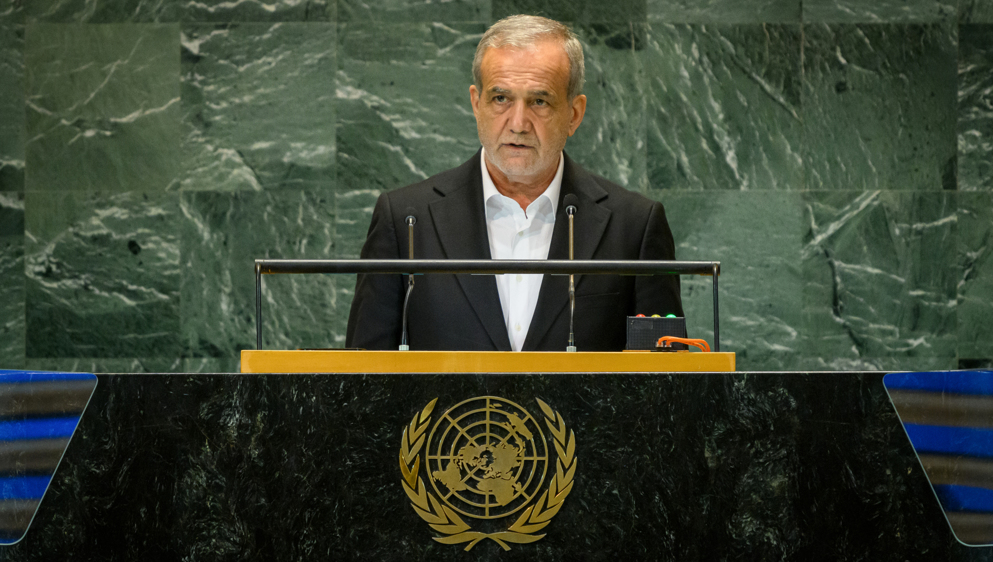
United Nations, September 24 (RHC)-- Iranian President Masoud Pezeshkian has called for cessation of the Israeli occupation and apartheid in Palestine and immediate implementation of a ceasefire in the Gaza Strip, where the regime has been waging a genocidal war for more than 11 months.
The Iranian leader made the remarks on Monday, addressing the United Nations Summit of the Future: Multilateral Solutions for a Better Tomorrow in New York.
“Cessation of the [Israeli] occupation and apartheid in Palestine and immediate ceasefire in Gaza are preconditions for international development and peace,” he said. “In a world where civilians are being killed ruthlessly in Gaza, blind state terrorism sheds the blood of children and women, and genocide and assassination is being supported, [conclusion of] no document would serve to guarantee peace and development,” the president said.
The Israeli regime claimed existence in 1948 after occupying huge swathes of regional territories during a Western-backed war. It occupied more land, namely the West Bank, including East al-Quds, and the Gaza Strip, in another such war in 1967.
Ever since, it has been enforcing an apartheid system in the West Bank by building hundreds of settlements and deploying the most aggressive restrictions on the movements of Palestinians there. Tel Aviv withdrew from Gaza in 2005, but has been keeping the coastal territory under an all-out land, aerial, and naval siege since a year after it left the territory.
The regime has also subjected Gaza to several wars, the most recent among which is still raging on since commencement last October. The brutal military onslaught has so far claimed the lives of at least 41,455 Palestinians, mostly women and children, and wounded 95,878 others.
Pezeshkian said Iran demanded elimination of weapons of mass destruction from the region without any preconditions. “Iran demands a strong, united, safe, and stable region, where the resources of the regional countries are used for [bringing about] synergy towards [realization of] economic and social development and disposal of common problems,” he added.
Citing an instance of Iran’s contribution to regional stability, he mentioned the Islamic Republic’s having invariably served as a leading force in fighting terrorism, and said the country was prepared for cooperation with other countries, which were similarly after “real confrontation” with the evil phenomenon.
The president, meanwhile, addressed the issue of the unilateral sanctions that have been imposed on the Islamic Republic and some other countries on the part of the United States and its allies.
“Unilateral sanctions stop realization of sustainable development goals,” he said, adding, “This fact has to be included in whatever document that is being prepared for the future.”
Pezeshkian proposed that UN Secretary General Antonio Guterres present the world body’s General Assembly with a comprehensive report on the issue of the sanctions that is compiled in cooperation with the countries that have been subjected to the economic measures.
Pezeshkian demanded immediate reformation of the ruling structure of the international financial institutions towards guaranteeing inclusion of developing countries in decision-making and norm-making processes and emergence of a just system that is answerable to those countries’ financial needs.
The president advised that world countries engage in cooperation and interaction on the basis of justice and honesty in order to be able to successfully confront the present and future challenges that face the international community.
He said such common endeavor required attention towards the role and stance of the United Nations, as the symbol of multilateralism, and attachment of respect to the goals and principles of the world body’s charter. “Let us create a just and prosperous future for our children,” he said.
Joint efforts aimed at realization of such a future have to be based on reinforcement of an international system of multilateralism that enables tackling such challenges as war, discrimination, poverty, and hunger at their roots, Pezeshkian said.
The Islamic Republic has included its standpoints in this regard in the Pact of the Future that was concluded among world leaders at the UN summit on Monday with the aim of adapting international cooperation to the current and future realities, he stated.
Elsewhere in his remarks, Pezeshkian enumerated the practical priorities of his administration. The priorities, he said, featured attention towards such issues as healthcare, education, welfare, creating equal opportunities, proper income distribution, reducing poverty and discrimination, and further empowerment of women and youths among other things.
Pezeshkian has travelled to New York on a three-day trip to address the 79th session of the UN General Assembly.

